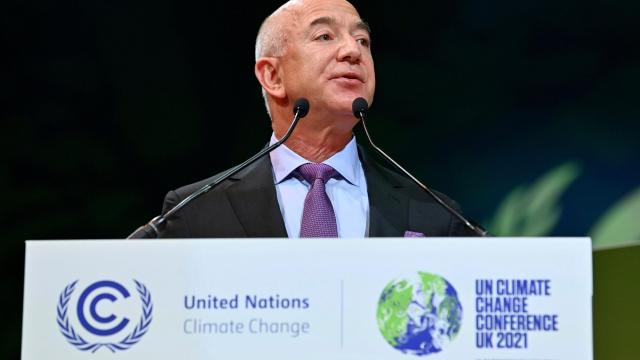Social media erupted this week when a single passage from this year’s World Inequality Report went viral comparing the carbon footprint of a short space joyride to a lifetime’s worth of emissions for the world’s poorest. The statistic perfectly encapsulates the unequal distribution of between those who cause climate damage and those who suffer from it.
The report doesn’t name the two billionaires most often associated with space travel: Elon Musk and Jeff Bezos. Musk’s SpaceX has been launching plenty of rockets, though none for tourism purposes yet. Bezos’ Blue Origin has, though, including sending the CEO himself in a heavily covered event in July. (Richard Branson, a third billionaire, has also sent himself to the edge of space.) All of those flights have carbon costs alongside their fiscal ones.
A few viral posts misinterpreted what the passage in the report was saying, so to set the record straight, this is what that section said:
An 11-minute flight emits no fewer than 75 tonnes of carbon per passenger once indirect emissions are taken into account (and more likely, in the 250-1,000 tonnes range). At the other end of the distribution, about one billion individuals emit less than one tonne per person per year. Over their lifetime, this group of one billion individuals does not emit more than 75 tonnes of carbon per person.
Though the passage doesn’t reference Jeff Bezos’ venture to the brink of (but not quite) space, it is a close enough substitute for that 11-minute benchmark put forward by the report. And the team made very conservative estimates, too, noting that the actual range of emissions was probably much higher than 75 tons per person. What the report shows is that the carbon cost of a few minutes of weightlessness equals the lifetime carbon output of an individual in the bottom billion.
It highlights unequal contributions made by someone who commutes in a private jet or, say, has a business devoted to launching rockets versus subsistence farmers. What’s more, those who can afford space flight will largely be insulated from the climate damage their trips cause while those in poor countries will be forced to bear the brunt of those impacts. After returning to Earth, Bezos said he realised we have “one planet, and we share it and it’s fragile.” While flying on a Blue Origin rocket may have opened his eyes to that, it doesn’t negate the fact that space tourism isn’t a very equal way to share the planet’s resources.
The report also noted that the top 1% wealthiest individuals emit about 110 tons of carbon emissions per year, an extreme number dwarf by the top .1% (467 tons) and the top .01% (2,530 tons). So all high-altitude flights aside, the wealthiest individuals still produce many times more carbon pollution in an average year than an individual in the bottom billion does in a lifetime.
Blue Origin’s next flight is planned for Saturday, when the football player-turned-talk show host Michael Strahan will climb aboard a rocket alongside four paying customers.
